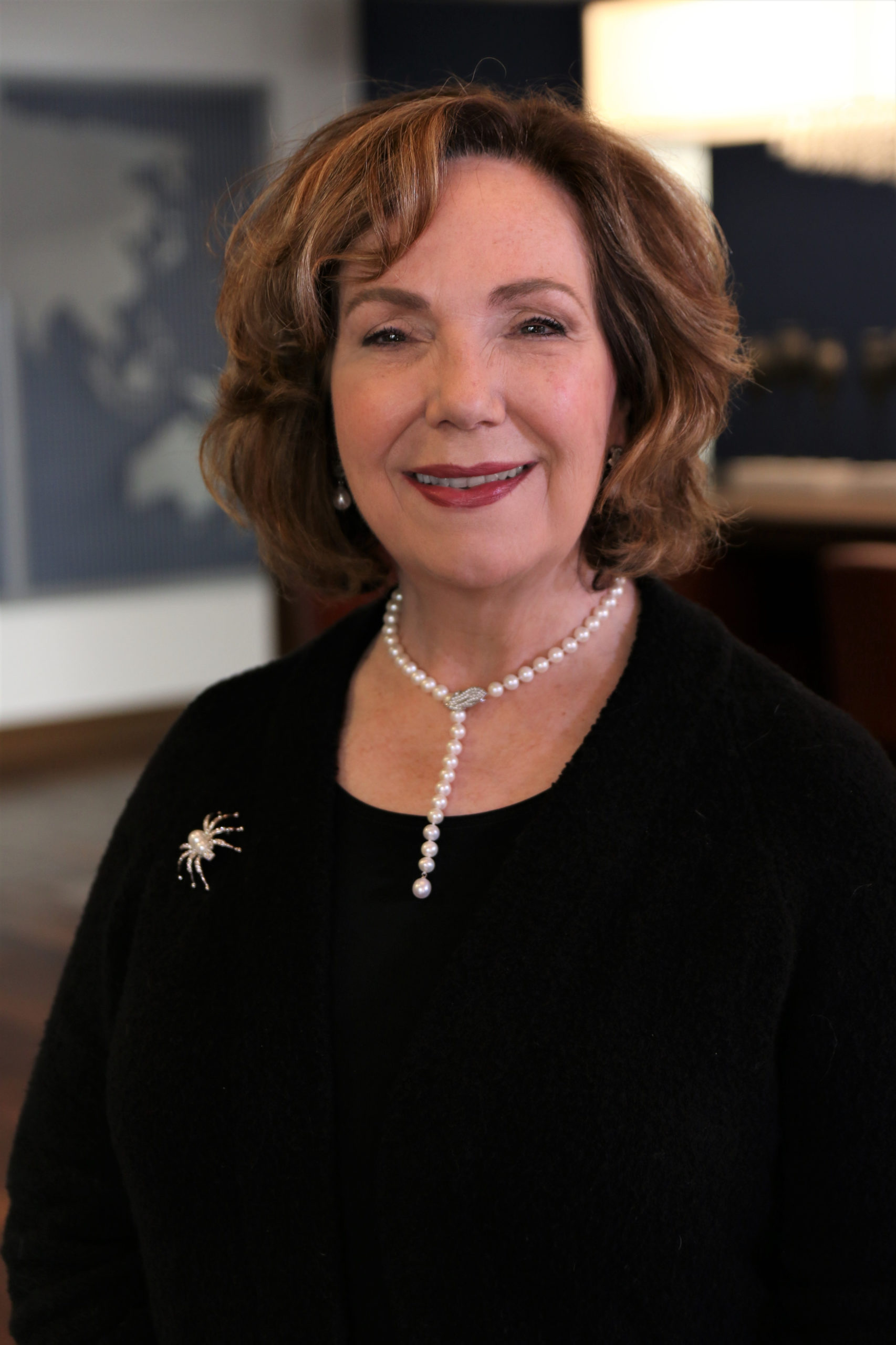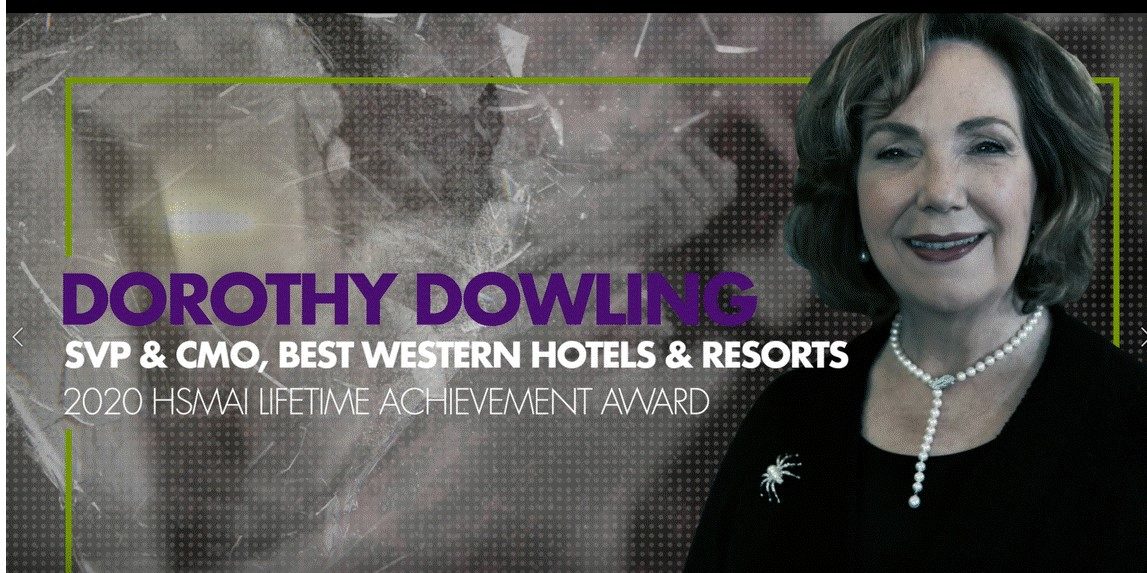
After 35 years in hospitality, nearly half of it with Best Western Hotels & Resorts, where she serves as senior vice president and chief marketing officer, Dorothy Dowling has earned more than a few honors. The long list includes but is by no means limited to being named to the Global Business Travel Association’s (GBTA) Top 40 Women in Travel, receiving GBTA’s Allied Member of the Year Award, being recognized as the 18th most influential chief CMO in the world in Forbes/ScribbleLive/LinkedIn’s CMO Influence Study in 2015, and being inducted into the Direct Marketing News Marketing Hall of Femme.
But her latest honor hits pretty close to home. During HSMAI’s Adrian Awards Celebration on March 23, she received the Albert E. Koehl Award for Lifetime Achievement in Hospitality Marketing. “HSMAI is an incredibly special organization to me because it has played such an important role in fostering my career,” Dowling said in a recent interview. “The learning opportunities and the peer networking opportunities from HSMAI have been truly transformational for me.”
Here are five other things we learned about Dowling during our conversation:
1. How she got into hospitality: “I’m Canadian by birth, I grew up in Toronto. When I did my graduate degree, I went to the University of Waterloo in Ontario, which I always characterize as similar to MIT, because it’s a heavy engineering/computer science school. The university had a large databank to support research activity, so I was able to do my master’s degree using the Canadian government office of tourism’s 10-year linear database. I did a 10-year longitudinal study on Canadian vacation travel habits, and then the office of tourism hired me as a result of that research. And that was my first real job. I didn’t have a plan to go into hospitality, but like many, I fell into it. From there I went to Laventhol & Horwath, where I was a consultant and then a senior consultant in the hospitality practice. When you’re in the consulting space, you often get hired by the client, so that’s really how I started on the hotel side, being hired by Relax Hotels in Canada.”
2. What she thinks is the key to hospitality marketing: “There are lots of things that I have learned over the years, but perhaps the most important — especially in today’s environment — is how to be agile and move quickly. As a hospitality marketer, you are dealing with perishable inventory, so you have to be evaluating information as it comes in and constantly iterating on the thought process. I’ve seen others join the hospitality business that have come out of a much more structured environment, like packaged goods or some of the industrial verticals, and it’s really hard for them to get their head around how you might have to pivot even within a week. Particularly right now with COVID, we are constantly monitoring consumer intentions and readiness to travel, and we’re forced to pivot and adapt to those evolving sentiments. I do think the hospitality industry really affords people the opportunity to take risks and continue to learn and evolve their thinking as they go.”
3. How she’s seen hospitality change: “One of the big changes I have seen in hospitality throughout my career has been attribution modeling. Currently, attribution modeling is a last-touch model, meaning the attribution goes entirely to the last touchpoint in the conversion path. While there are tremendous benefits to attribution modeling, such as giving us great insight into consumer engagement and their participation with our lower-funnel marketing, it does not provide a full view of the customer journey. I have seen a greater focus on attribution modeling in our industry, but I encourage people to think of it as a guiding post as opposed to an exact science.
“The other change that I’ve seen in the industry revolves around the question, are we a hospitality business or a hotel business? It’s the nature of hospitality versus the real estate part of our business. I think that both live together, but the question has come about as a result of the investment structures that have fueled the growth of the industry. Today there are different stakeholders in terms of asset managers and the ownership investment component, which has taken on a different level of decision making — short-term, medium-term, long-term decisions; how we really think about our business model in terms of growth; and where our industry is going to evolve over the next couple of years. There’s been a real change in that real-estate mindset, which I don’t think is good or bad. I just think it’s different.”
4. How’s she’s feeling about the recovery: “I have the good fortune of participating in different industry partnerships, and there’s a tremendous sense of optimism — there is a lot of light at the end of the COVID tunnel. We’re seeing good signals that the recovery is going to happen soon and that we will have a good summer in the U.S. and Canada. Maybe not as great as 2019, but the U.S. and Canada are on the path to recovery. The rest of the world, it’s more of a Q4 recovery. So, I feel good about our North American hoteliers and I feel comfortable about our European hoteliers that there will be a definite path to recovery. For Asia, I am in wait-and-see mode, because there’s still quite a bit of risk as to how the vaccine deployment will come to be in the Asia-Pacific region. And then, because there’s so much dependency on intercountry travel in the region, I’m not as confident in terms of when that’s going to play out.”
5. What advice she has for new hospitality professionals: “I think there is a lot of fear when it comes to starting a career in hospitality today. It is widely known that the pandemic has had a devastating impact on the industry, with many regretful layoffs across hospitality companies. There’s still uncertainty as to when people are going to be rehired and if new graduates are going to have a shot in the hospitality industry given the tremendous levels of unemployment that we still have.
“What I have offered is that the hospitality industry is a great learning environment. There’s a lot of opportunity to grow, because you’re given a great deal of responsibility early in your career, which I think affords you applied learning like nothing else I’ve experienced. In the early years of a hospitality career, you won’t see high compensation and you will be asked to invest a lot of time. You’ll likely be thrown into a variety of situations where you’ll be forced to learn as you go and figure it out along the way. But I do believe that those experiences are invaluable in your personal and professional development, and you earn a sort of gravitas in terms of having experienced situations way above what your potential job title might be in an organization.”
Watch the Lifetime Achievement Award presentation and acceptance.

